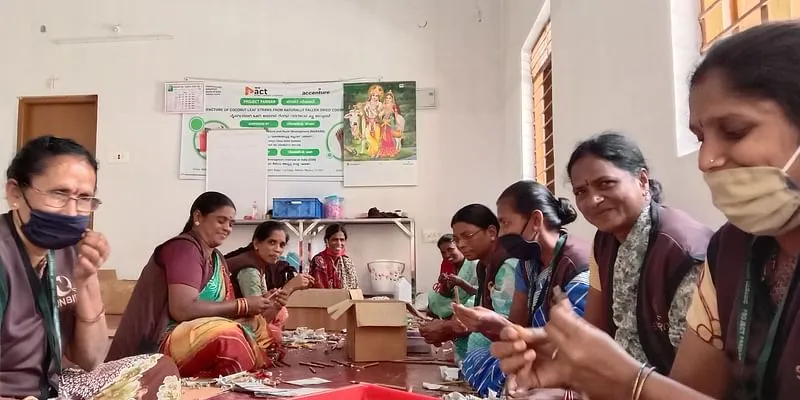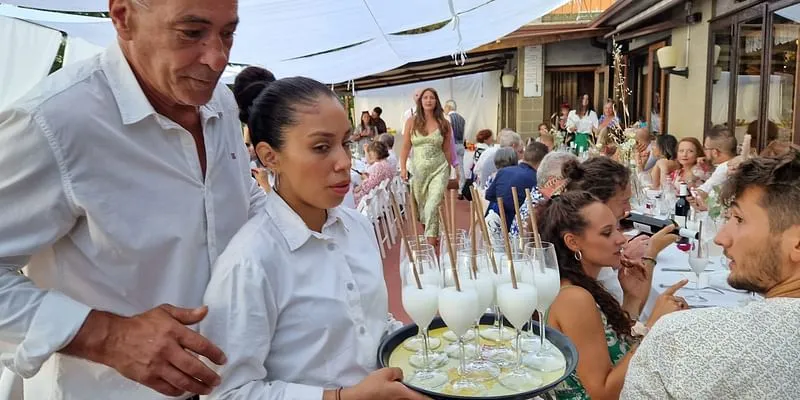How Sunbird Straws makes biodegradable straws from dried coconut leaves
The company employs women from rural areas of Kerala, Tamil Nadu, and Karnataka to produce drinking straws. It has adopted a hub-and-spoke model in an effort to speed up production and save costs.
Five years ago, Saji Varghese, an associate professor of English at Christ university in Bengaluru, was on a walk around the university campus when his attention fell on a dry coconut leaflet that had fallen on the ground.
Just the day before, Saji had had a conversation with a guest from the Netherlands on the impact of single-use plastic. So, when he spotted the dry leaflet, he had an “epiphany moment”, as he calls it, which sowed the seeds of .
The dry leaflet, which would have been immaterial to many, struck as an opportunity to Saji. He thought it could be converted into an eco-friendly alternative to plastic straws to create a "positive impact" on the environment—something he had always been mulling over.
Thus began his experiments with dry coconut leaflets. While pressure-steaming the dry coconut leaves during his experiments, Saji noticed a shine appearing on the surface of the leaves. He discovered that naturally dried leaves possessed a natural wax, which came to the surface upon steaming. Saji realised that the wax could give the proposed straws anti-fungal and hydrophobic properties, which are vital in drinking straws.
Three years later, in 2020, the professor started Sunbird Straws to manufacture drinking straws made from naturally dried coconut leaves.
Hub-and-spoke model
The process of production of Sunbird's coconut leaf straws is based on a hub-and-spoke model, which results in minimal wastage, says Saji.
The spokes (pre-production units) are located in the rural areas of Kerala, Tamil Nadu, and Karnataka, which have plenty of coconut farms—Thoothukudi, Nagercoil, and Madurai in Tamil Nadu, Bannur and Mellahalli in Karnataka, and Kasargod in Kerala.
Women from these areas collect dry coconut fronds and remove the midrib from the leaves. Then the leaves are cleaned and cut to the appropriate width, using machines deployed at the spokes. Finally, they are bundled and sent to the production hubs located in Thoothukudi, Kasargod, and Bannur.
“Only the processed leaves are sent to the hubs, which saves cost on logistics,” says Saji.
The production of straws happens at these hubs using spiral rolling and long rolling machines. The post-production, which happens in a unit in Bengaluru, involves final cutting, cleaning, UV sterilisation, quality checking, and packaging.
Technological innovation has helped the team improve its production process, says Saji. The team has developed a conveyor system that can make one straw every 1.5 seconds; earlier it used to take 45 seconds per straw.
Currently, the company produces around 6,000 straws a day. Every month, it produces close to two lakh straws. By the first quarter of 2023, Sunbird aims to produce 15 lakh straws per month.
Eighty-six women are employed in both the pre-production and production stages, thus “creating yearlong income opportunities for them,” says Saji.
Investing Rs 20k, these entrepreneurs made eco-friendly plates using areca leaves. Now their business records Rs 18 Cr revenue

Sunbirds' straws and pens
The product range
While Sunbird Straws started out with single-layered straws, it has now developed multi-layered straws, which, Saji says, are "more sturdy, efficient, and aesthetically better."
Sunbird offers eight varieties of straws—ranging from a diameter of 3 mm to 12 mm, with varying lengths. The straws, which can be used only with cold beverages for over three hours, have a shelf life of nine months.
Commenting on the biodegradability of these straws, Saji says, “They are natural and chemical-free. Hence, the degradation time equals the time that dry leaves take to degrade.”
Apart from straws, the company also sells writing pens made from dry coconut leaves. About 96% of the pen is made of coconut leaf and 4% is plastic, says Saji.
Comparing Sunbird’s straws and other eco-friendly variants in the market, Saji says, “Paper straws are not entirely eco-friendly, because you cut trees to make paper. They are chemically bleached and become soggy in a few minutes.
“A properly processed bamboo straw will cost anywhere from Rs 20 to Rs 30 and go up to Rs 120. Hay straws are limited by diameter. Steel straws are expensive, and have to be maintained as per proper hygiene.”
Sunbird's straws are priced Rs 1.70 to Rs 2.50, depending on their size and dimensions. The manufacturing cost per straw is Rs 1.20, says Saji.

Women at Sunbird Straws' production facility
Overcoming challenges
The initial hurdle for Saji was to understand the overall startup ecosystem and how it worked. The understanding came gradually through mentorship programmes.
The other challenge was technology upgradation to meet demand. This meant finding ways to produce straws at a faster rate.
During the pandemic, the process of testing slowed down due to travel restrictions. However, there was a surge in demand for the straws during the middle of the second lockdown. Saji thinks this was perhaps due to the increased environmental consciousness among people and the need for better hygiene.
Growth so far
Sunbird’s straws are sold on Amazon and Flipkart. The company’s B2B clients include Four Seasons, Accor Group, Novotel, Ibis, and Chai Days. It also has a few distributors in Europe, Middle East, the US, and Canada.
According to filings with the Registrar of Companies, Sunbird Straws generated a revenue of approximately Rs 4.5 lakh in the fiscal year 2021.
Sunbird Straws has received grants of about Rs 1 crore from organisations such as Swiss Re, HDFC, SELCO foundation, and NABARD, and the central government.

Sunbirds straws being used in a restaurant abroad
Future roadmap
According to Saji, the straw market in the country is valued at $8 billion, and Sunbird is looking at a serviceable, obtainable market of $5 million by FY 2023-24.
The company’s target, over the next three years, is to scale production to 10 lakh straws per day and employ 1,000 women. It is also exploring joint ventures overseas and working on more products from dried leaves.
Meanwhile, the business is all set to make an appearance in Kuberan’s House—an Indian reality television show focused on startups and entrepreneurs.
Edited by Swetha Kannan







